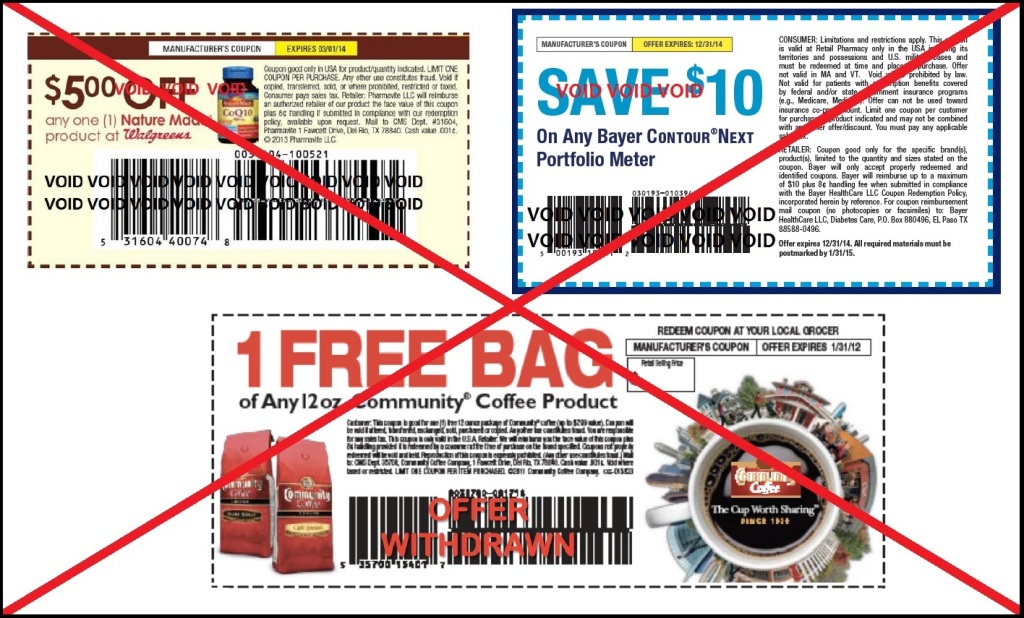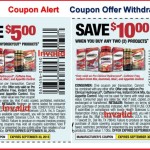
It’s been three weeks now since the makers of Nature Made vitamins took the rare step of voiding a valid coupon offer, and customers are still complaining. Complaining about their coupons suddenly becoming worthless, complaining about being treated like criminals at the checkout, and complaining about the company’s steadfast refusal to address the subject in any detail. The underlying issue is whether the whole mess was the fault of unscrupulous couponers – or the fault of a company that should have known better than to fall victim to the perils of PDF coupons.
To the uninitiated, a “PDF coupon” is shorthand for a coupon that’s available online as a PDF document. That means the coupon is visible on the computer screen, so all you have to do is “print screen” and clip the coupon. The problem is that there are no controls – while more advanced printable coupons limit users to two unique prints per computer, a PDF coupon can be printed, saved, shared, republished and used ad infinitum.
It’s for that reason that the Coupon Information Corporation warns manufacturers against the practice. “Coupons should not be in a PDF, .doc or any other format that can be e-mailed,” reads a CIC best practices guide for printable coupons. “Coupon images should never appear on a computer screen.” Companies that don’t heed that warning, risk having their coupons – particularly high-value ones – spread all over the internet, printed in batches, and even counterfeited.
These days, with much more sophisticated printable coupon technology available, most companies avoid PDF coupons. Or so they think. Whether or not they realize it, manufacturers have a whole lot of coupons out there in PDF format – in online editions of magazines, newspapers and supermarket sales circulars.
If a manufacturer issues a PDF coupon on its own website or sends it out via email, it’s assumed they want you to print it out and use it. But if a manufacturer issues a coupon in a printed publication, and that publication then makes an electronic edition available online, is it okay to print the coupon off the page and use it? Is it okay to print multiple copies? Can you save the PDF to your computer and print at your leisure? And email it to friends? That was the basis of the Nature Made coupon debate, and no one is quite willing to issue a definitive answer on what part of this is okay – and what constitutes crossing the line.
Nature Made Goes Nuclear
Many retailers insist they would never accept a printed coupon from an online publication, because they would never get reimbursed for it. Some consumers, however, believe that a PDF coupon is a PDF coupon – if it’s okay to print it from a manufacturer’s website, then it’s okay to print it from a legitimate publication on a reputable retailer’s website.
That’s what Pharmavite, the maker of Nature Made, and Walgreens led consumers to believe. Last fall, Pharmavite offered two coupons in Walgreens’ “Diabetes & You” magazine – $3 off any Nature Made product, and $5 off any Nature Made product. The free quarterly magazine is available in Walgreens stores – and, notably, on Walgreens’ website. So if you couldn’t find the magazine in stores, no worries – the coupons were right there on page 9 of the online version of the publication.
It seemed too good to be true, for couponers who knew that $3 and $5 Nature Made coupons are high-value enough to get vitamins for free – plus overage, in stores that allow it. Shoppers who asked on Walgreens’ Facebook page whether it was acceptable to print the coupons from the online version of the magazine, were told that “customers can print from the online version of the Nature Made coupon and the stores should accept them.”
Suddenly, though, page 9 of “Diabetes & You” mysteriously disappeared from Walgreens’ website. “In some cases, offers may be more popular than the vendor anticipates,” Walgreens spokesperson Mai Lee Ua told Coupons in the News. “We value our relationship with advertisers and therefore, in some cases, we have the ability to modify agreed upon programs based on the vendor’s needs.”
“Modify”, as in, yank the coupons off the internet. But unfortunately for Nature Made, that train had long since left the station. Enough people had saved the file, and shared it with others, that there was no putting that coupon genie back into the bottle. Print-at-home versions of the $3 and $5 off Nature Made coupons were being used at Walgreens, and other retailers, across the country.
So Pharmavite went for the nuclear option. Via a January 28th notice published by the CIC and distributed to retailers nationwide, Pharmavite withdrew the coupon offers – retroactive to December 29th – saying it would no longer accept them or reimburse retailers who submitted them. That’s even though the coupons didn’t expire until March 1, 2014, and even though many customers still had coupons they clipped from the actual printed magazines. “Pharmavite LLC is taking this action due to unauthorized coupon redemptions at other retailers; the unauthorized transfer of coupons; and the unauthorized reproduction of the coupons on certain websites,” the notice stated.
No mention of any objection to customers printing the coupon from the online publication – just an objection that the offer got out of hand once the coupon was removed from said online publication. The use of the vague term “transfer” is generally understood to mean saving, sharing or republishing a coupon image, though good luck getting anyone to provide a coupon-dictionary definition of the often misunderstood term. Several Pharmavite spokespeople contacted by Coupons in the News offered no clarity and merely parroted the company line, “Due to unauthorized use of the Nature Made $5.00 Off and $3.00 Off coupons in the Walgreens ‘Diabetes and You’, Winter 2014 publication, Pharmavite has withdrawn those coupons. We apologize for any inconvenience consumers might have.”
They also didn’t elaborate on the “unauthorized coupon redemptions at other retailers.” The coupons stated “$3/$5 off any Nature Made product at Walgreens”, but didn’t say “redeemable ONLY at Walgreens.”
But that’s another can of worms altogether.
Some Nature Made customers are still smarting about the whole thing – and blaming Pharmavite for being naive about the consequences of offering coupons in a PDF publication at all. “Why don’t you look to your own advertising department for not seeing this coming a mile away. Ridiculous,” one commenter recently wrote on Nature Made’s Facebook page. “A PDF coupon is a STUPID idea. Don’t you dare call it fraud when any consumer prints out 50 of a PDF coupon. That’s your own fault for not putting limits,” lectured another. “The appropriate thing to do would be to reimburse retailers for this coupon, and stop issuing PDF versions of your coupon, since you have no intention of honoring them,” grumbled a third.
Buy a Bayer Glucose Meter, Earn Ten Bucks
Making matters worse, the whole Nature Made coupon debacle came on the heels of a similar PDF coupon controversy, involving Bayer.
A small pharmacy chain in Northern California offered a PDF version of its sales circular back in November – which remains available online, and includes a coupon for $10 off a Bayer Contour Next glucose meter that doesn’t expire until December 2014. Last month, savvy shoppers realized they could use the coupon at CVS and Walgreens, which had the meters on sale for $10, with a corresponding offer of $10 in store rewards, for a net profit of ten bucks for every one “purchased.”
Needless to say, Bayer Contour Next meters flew off the shelves. Some shoppers walked off with hundreds of dollars worth of “overage” in their pockets, and enough meters to supply a diabetes clinic. Others who found that distasteful questioned whether the coupons could or should even be printed from the California pharmacy’s online ad.
Like Pharmavite, though, Bayer expressed no particular concern about its coupons being printed from the online ad. Unlike Pharmavite, however, it did not withdraw the coupon offer. Instead, it cited its coupons’ fine print – restrictions that were written in plain English, without that vague “transfer” word. “Some coupons were improperly redeemed at select U.S. retail outlets recently,” Bayer spokesman Chris Loder told Coupons in the News. The company’s “instructions for proper coupon redemption,” he explained, include stipulations “such as one coupon per customer and that coupons not be redeemed in combination with other offers or discounts… We are working to ensure that consumers and retailers understand and comply with these instructions.”
In other words, you can print as many of those PDF Bayer coupons as you’d like – but according to the fine print, you can only use one, and you can’t double-dip with other offers. It may be very trusting of Bayer to believe that all consumers will heed such restrictions, but at least its intentions are clear – clearer than saying that a coupon can’t be “transferred” and then refusing to explain what that means.
Free Coffee For Everyone!
You might think that companies and retailers would have learned a lesson by now. And some have – many retailers whose online publications contain coupons, black out the bar codes, or stamp “VOID” all over them. But others blithely continue to publish PDF versions of their publications that contain manufacturer’s coupons, and the manufacturers end up shocked, SHOCKED, that people are printing them en masse.
It’s reminiscent of what happened to Community Coffee in 2011. It ran a coupon for a free bag of coffee in the Atlanta Journal Constitution, which was republished in the newspaper’s free online edition, and word swiftly spread around the internet.
Many argued that printing the coupon from the online edition of the newspaper was no better than photocopying it from the actual newspaper – a clear no-no. Others argued that it was no different from any other PDF coupon – if it’s available online from a legitimate source, it’s fair game.
Some who printed multiple copies, and got multiple bags of free coffee before Community Coffee pulled the offer, claimed they felt bad about taking advantage of a clear oversight on the part of Community Coffee and the AJC. “I’ll probably still feel bad two years from now, when I’m sitting here sipping my free coffee,” one commenter noted dryly on an online coupon forum.
So What Next?
As long as manufacturers offer coupons in printed publications, and electronic editions of those publications end up online, it’s safe to assume that such scenarios will just keep on happening. Ethical couponers will insist that even though it’s possible to print multiple copies of the coupons, save them, share them and republish them on other websites, it’s just not right. Others will do just that, and not feel bad about it, even at the risk of prompting manufacturers to clamp down on their coupon offers and spoil couponing as we know it.
Manufacturers may try to fight the problem with “one coupon per customer” wording, or throwing in a few prohibitions against “transferring” or “reproducing” a coupon, when by definition the coupon has already been “transferred” and “reproduced” the moment it appeared in an online version of a printed publication. So the publisher of the coupon then ends up as guilty as anyone who prints it.
In the end, the CIC offers this advice: “Virtually all manufacturers include clear and direct statements on their coupons that it is prohibited to sell, auction or otherwise transfer the coupon and/or that the coupon is void if it is sold, auctioned or otherwise transferred. It is hard to see how this policy, or the consequences of these actions, could be any clearer.”
That’s unless manufacturers and retailers don’t heed the CIC’s advice about not offering PDF coupons at all. Then the whole issue will remain about as clear as mud the next time something like this happens. Which, at this rate, it almost certainly will.











Pingback: Printing Coupons without downloading coupon printer software
How odd is it when you randomly find an article that interests you through a google search and find it quotes something you yourself said.
I still blame the advertising department at Pharmavite.
Good article! I think that companies that insist on utilizing PDF coupons are mis-understanding the marketplace that regular couponers exist within.
We see freebie offers all the time at major chains, including on high-value items of $10 and up. For example, those same blood glucose monitor systems are regularly advertised as free after rebate in the weekly Walgreens circulars! So to expect a new couponer, or even an experienced one, to differentiate between one freebie and another is frankly just asking for trouble.
Companies that cut out the PDF coupons and make it clear to chains that they won’t reimburse for improperly used coupons will solve their own problems right away. Don’t put it on the consumers to police themselves when their deals appear completely legitimate.
Thanks Jenn – you have a very good point. There are clearly couponers who will push the boundaries, ignore the fine print, take advantage of loopholes and errors, etc. But there are plenty more couponers who just aren’t clear about what’s allowed and what isn’t. And companies that keep their policies vague and say it’s fine to print and use those PDF coupons to your heart’s content – and then act shocked when people do just that and start adopting a blame-the-consumer attitude – don’t do themselves any favors in the end.